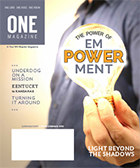
June-July 2017
The Power of
Empowerment
------------------
|






Vulnerability
By Bonny Kate Simpkins
Vulnerability. What an interesting word! Open the dictionary and
you will find it defined as “easily hurt or harmed; open to attack or damage.” A thesaurus lists synonyms including susceptible, open, exposed, and sensitive. All of these lead us to view vulnerability as weakness when, in
reality, vulnerability holds the potential key to unlock one’s utmost strength.
Allow me to explain. Throughout my Christian life, I have heard again and again that Christians should “let go and let God lead.” We are told simply to release control and let Him move and direct our lives, trusting Him to make the next step clear. This has always bothered me, because I struggle to let go. Let me be “vulnerable” with you for a moment. I am a recovering perfectionist and an extremely goal-oriented individual. For the most part, I do well in accomplishing my goals. Yet, as hard as I have tried to hand over control to God, I have never accomplished that goal completely. Maybe for brief moments, but when fear sets in, I automatically reach for control of my life.
Learning to Let Go
It is my assumption that every Christian struggles with this to some extent. Letting go is not simple or easy, perhaps the hardest thing humans attempt. Yet, I wonder, do we ask God to help us do this incredibly difficult thing? I question, without His help, will we ever have the strength to give Him our lives entirely? And this need for His strength is exactly what keeps us reliant on Him. You may be thinking, “Everyone knows this. We are weak; God is strong, but where does vulnerability come into play?”
Recently, I did an informal survey of my friends, family, and students, asking them to describe vulnerability in their own words. One said, “Being vulnerable is a position where you feel helpless. You are stuck between a rock and a hard place with no way out, so you just do what is asked of you.” Another replied, “Vulnerability requires transparency, full honesty, and opening up in such a way that you acknowledge the other person could hurt you with the information you are freely giving them.”
Wow! These are accurate descriptions of how most of us view vulnerability. The first makes a great point. Vulnerability is indeed a place where one may feel he or she has no other option than to do what is asked or expected. (Hang on to that thought for a minute.) The second describes the need for transparency, honesty, and openness, knowing that people can hurt you as a result. (Also hang on to that thought, and keep reading.)
When we as believers are open, transparent, and sensitive (vulnerable) to the Holy Spirit, based on the definitions considered this far, we make ourselves susceptible to harm or pain. If this is true, then why would we give ourselves fully to God, opening up to Him completely, and placing our lives in His hands without reservation? It’s a matter of faith.
When Faith and Vulnerability Collide
A beautiful thing happens when faith and vulnerability collide. Faith requires vulnerability, and it is hard. It is helpful to remember God not only created love, but He is love. According to Psalm 136:26, “His steadfast love endures forever.” Let that soak in. Not only is God patient and kind, He also does not seek to hurt us, but rather to love us deeply and persistently. Most importantly, He is safe, He is security, and He is the best place to learn the art of vulnerability. You can be completely open with Him, knowing He will never harm you.
Vulnerability is the essence of openness, and when you allow yourself to be open with our loving Father then (and only then) He can speak to you and guide you. Just as free will is enacted in our decision to choose Christ, it is also active in our decision to be open with Him and vulnerable before Him, acknowledging weakness and choosing His strength.
First Samuel 2:4 says, “The bows of the mighty are broken, but the feeble bind on strength.” You may consider yourself a person of might physically, mentally, and emotionally. Perhaps you do good things for many people. Perhaps you are wealthy. Maybe you have started a humanitarian effort that reaches the nations (an incredible thing in itself). But this verse reminds us that if we rely on our might alone, our “bows and weapons,” are broken. Fascinating.
This doesn’t mean we don’t have these resources, it just means we are limited in using them in our own power. There is a difference between might and strength. Might regards size, how massive something is. In contrast, strength is a gift, “a good or beneficial quality or attribute.” When this verse says the “feeble bind on strength” it refers to the weakest of all who latch onto strength that is not their own.
The Strength of Weakness
Self-reflection in this area usually isn’t pretty. I am weak, so incredibly weak as a human. I want badly to say I cling to God’s gift—His strength. Yet, the reality is that on a regular basis, I rely on my own might. I cling to what I know. This is frustrating but let me make one thing clear; it is absolutely a normal process of humanity, to cling to what we know. That is the fall of man, right? We play God, in a sense, even when we don’t realize that is what we are doing. It’s okay. If you get nothing else from this, know it is okay to feel scared and head back to wanting to control. However, also know that when we release our arrows and broken bow by handing them over to the One who can “bind on strength,” we receive strength in return. It’s an exchange that doesn’t work any other way.
My reality (and probably yours) is that every morning I wake up and choose to cling to Jesus, the source of strength I am describing. Yet throughout the day, I struggle to exchange my arrows for His strength. Too often, when difficulty arises, I find myself grabbing for my own arrows again. I forget the real battle is letting go of might and resting in His strength, perfected in my weakness (2 Corinthians 12:9).
This is such a daunting process. We trust; we control. We trust; we worry. We trust; we take back what we have given Him. And the cycle continues. “Why even try?” you ask. Because without this grace-filled relationship that allows you to change, you would be trapped in an endless cycle of control and guilt. You would never give up your weakness but continue to use a useless, broken bow with perfectly good arrows.
I challenge you to cling to the everlasting strength God offers. Remember, Jesus came to Earth just as human as we are and left as a flawless individual. He struggled in all of the same ways, but didn’t sin (Hebrews 4:15). Not once! And we can be certain that because the almighty King of the universe walked and lived among us, He understands the struggles we face. How incredible.
Vulnerability requires complete openness, and when that is applied to your relationship with Christ, He becomes your greatest strength. Vulnerability acknowledges you are susceptible to the world’s wounding, but what can the world take from you, when you have already given yourself away to the One who has overcome the world?
About the Writer: Bonny Kate Simpkins earned a bachelor’s degree in Behavioral Science in 2013 from Trevecca Nazarene University,
where she is currently pursuing a degree in Masters of Marriage and Family Therapy/Counseling. She also works at Trevecca
as a resident director and attends The Donelson Fellowship in Nashville, Tennessee.
|
|

